
Jonathan Coulton Interview
Tuesday, May 19th, 2009 | by matthew mcglynn
 When I first heard Jonathan Coulton’s new song, the verse melody was stuck in my head for three days. I ended up listening to it a lot, too, in between the mental playbacks, because beyond the clever lyrics and the melody lines you can’t pry from my brain with a fork, the song sounds great.
When I first heard Jonathan Coulton’s new song, the verse melody was stuck in my head for three days. I ended up listening to it a lot, too, in between the mental playbacks, because beyond the clever lyrics and the melody lines you can’t pry from my brain with a fork, the song sounds great.
I had the sense that Coulton is recording all his own stuff, but I wanted to know how deep his DIY ethic goes. Ironically, to get an answer I first had to ask his publicist.
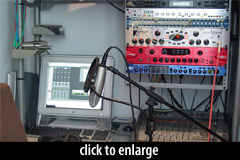 But my instincts were correct. On the new track, Coulton plays every instrument but the drums. He tracked everything himself in a small home studio, and mixed the song himself — on headphones. Don’t the guys at Tape Op have a trophy for this kind of effort?
But my instincts were correct. On the new track, Coulton plays every instrument but the drums. He tracked everything himself in a small home studio, and mixed the song himself — on headphones. Don’t the guys at Tape Op have a trophy for this kind of effort?
The result is a lot of fun. Listen to the song here: Blue Sunny Day. Coulton’s intro to the song on this live performance is great too. (And he has the best audience ever.)
There are a number of interesting biographies for Coulton floating around, so rather than attempt to come up with another I’ll just point you here or here. Also don’t miss his duet with Ze Frank.
And now for the interview:
Describe your home studio. Has it changed much since you started out? What sort of upgrades has your success financed?
JC: Not that much — I’m not a huge gear head, and the working theory is that my ears are generally not good enough to warrant spending tons of money on “the best” stuff.
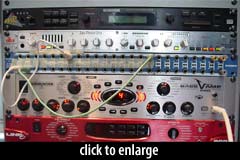 When I started doing the music thing full time I had already used day job money to build up a pretty decent collection of gear. At that point I had a Digi002 and Pro Tools LE running on an Intel Mac Mini. I had an AT4040 and an SM57, a dbx 376 tube channel strip that just about everything goes through on the way in, and a Pod Pro for guitar sounds.
When I started doing the music thing full time I had already used day job money to build up a pretty decent collection of gear. At that point I had a Digi002 and Pro Tools LE running on an Intel Mac Mini. I had an AT4040 and an SM57, a dbx 376 tube channel strip that just about everything goes through on the way in, and a Pod Pro for guitar sounds.
Somewhere along the way I straightened out the bass situation in a very cheap way, bought the cheapest Fender bass they had in the store one day and a super cheap Behringer V-Amp bass amp modeler. I used whatever plugins I had free with Pro Tools for a long time (and still do) but I’ve picked up a Lexicon MX200 since then. I bought a Nord Stage Compact [keyboard] pretty recently. And then there’s the ever-growing whole bunch of guitars and other plucky instruments, the standard array of shakers, noise makers, toys, etc.
What lessons have you learned about mixing? Are you doing mixes “in the box” or are you doing some analog compression and summing via outboard gear?
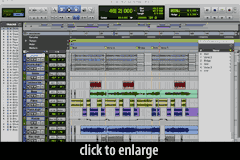 JC: I do everything on the computer, and I usually mix with headphones — I know you’re not supposed to, but the fact that my studio is right next to the kids’ room means that I don’t have a choice much of the time. Now I’ve gotten used to it, and I just check periodically through speakers to make sure I’m not doing something stupid.
JC: I do everything on the computer, and I usually mix with headphones — I know you’re not supposed to, but the fact that my studio is right next to the kids’ room means that I don’t have a choice much of the time. Now I’ve gotten used to it, and I just check periodically through speakers to make sure I’m not doing something stupid.
Mixing is hard. I’m never really 100% satisfied with a mix, and I really make everything up as I go along. I do pretty standard stuff — double tracking guitars hard panned left and right, backup vocals spread out and doubled. Mostly the trick is to stay out of your own way, don’t gum everything up with too much stuff. Often I find that if the arrangement is right, very little mixing actually needs to be done. There’s something really great about just hearing vocals and guitar together; the rest is just gravy.
For songs like Blue Sunny Day that are arranged for a full band, what tracks do you perform, and where do the rest come from?
JC: Drums are very often from a collection of loops called Reel Drums — you get multi-track Pro Tools sessions that are tempo mapped and copy and paste really nicely, so you can really mess with the sound and the arrangement. They just sound great because they’re actual drums, I’ve never been able to get any MIDI situation to sound like anything other than MIDI.
In a few cases I’ll grab a loop from Soundtrack or Ableton Live and just live with the fact that I won’t have a complicated drum track for that song. Limitations like often turn out to be good things, sort of creativity by necessity. The rest of it is me — any guitar you hear for sure, keyboards, accordion, banjo, mandolin, uke, that’s all me. I find that most of the time I can get away with the fact that I’m not really an expert player of any of these things. A little bit of banjo (poorly played) can go a long way.
Your website has been pretty sluggish since your blog post on the economics of selling original songs via the honor system, so I’m guessing you’ve exceeded the initial $200 in revenues reported on the March 24th. What’s the score now? Or, what’s the value of a server meltdown wrought by social media?
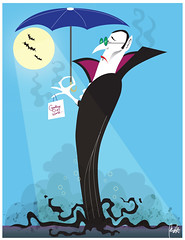 JC: For Blue Sunny Day, still not very much — about $400 maybe? But again, I don’t think of each song in terms of how much money it’s going to make; that way lies madness. I’ll just keep putting stuff out and hope that the big picture will ultimately make sense financially. The thing is, it’s impossible to measure the indirect income from that song, how many people were pushed over the edge into buying other things by that song, how many vampire fans have seen the YouTube videos of me doing that song live and become fans, etc.
JC: For Blue Sunny Day, still not very much — about $400 maybe? But again, I don’t think of each song in terms of how much money it’s going to make; that way lies madness. I’ll just keep putting stuff out and hope that the big picture will ultimately make sense financially. The thing is, it’s impossible to measure the indirect income from that song, how many people were pushed over the edge into buying other things by that song, how many vampire fans have seen the YouTube videos of me doing that song live and become fans, etc.
If (when) a record label approaches you, would you be interested in the distribution they can provide, or do you figure you’re better off as an independent artist making full use of the internet as a free distribution network?
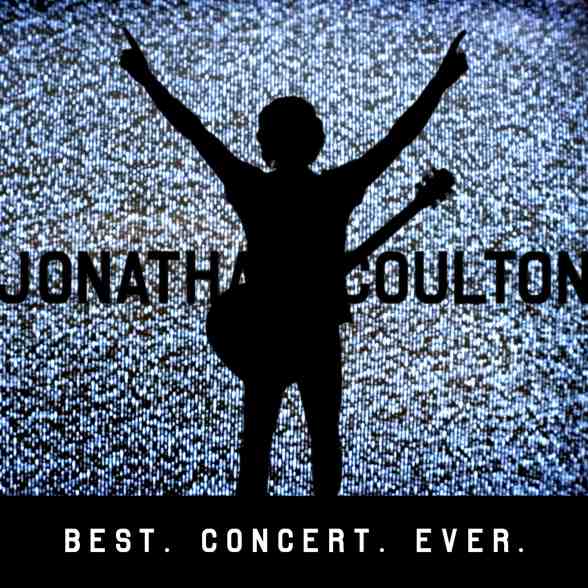 JC: I’m trying an experiment with my new concert DVD/CD “BEST. CONCERT. EVER.” and distributing it through a company called What Are Records. They’ve been great so far, and while my cut is going to be a little smaller than it would be if I were doing it myself, I don’t have to keep boxes and boxes of those things around. And the theory is that they’ll be able to get me into more places than I would get to myself, like maybe old fashioned brick and mortar retail (I know! That’s still around apparently!). We’ll see how it goes — I’m not opposed to the idea of labels on general principles or anything. It just makes sense that after a certain point, handling everything on your own becomes burdensome enough that it’s worth a certain amount of money to have someone else do it. And that line gets drawn differently for everyone. It’s always just a question of any given deal bringing you enough value to offset what it costs you in money.
JC: I’m trying an experiment with my new concert DVD/CD “BEST. CONCERT. EVER.” and distributing it through a company called What Are Records. They’ve been great so far, and while my cut is going to be a little smaller than it would be if I were doing it myself, I don’t have to keep boxes and boxes of those things around. And the theory is that they’ll be able to get me into more places than I would get to myself, like maybe old fashioned brick and mortar retail (I know! That’s still around apparently!). We’ll see how it goes — I’m not opposed to the idea of labels on general principles or anything. It just makes sense that after a certain point, handling everything on your own becomes burdensome enough that it’s worth a certain amount of money to have someone else do it. And that line gets drawn differently for everyone. It’s always just a question of any given deal bringing you enough value to offset what it costs you in money.
I see a lot of non-artists smugly suggest that artists should be giving away recorded music for free and monetizing their work through concerts and T-shirt sales. For my part, if I wrote a great song I’d sort of like to reserve the right to be paid for it. What do you think?
JC: That may not be up to you. I’m not entirely sure that the future of music is free, but it certainly is trending in that direction. I think whatever your opinion about how consumers SHOULD treat music, you sort of have to live with how they DO treat it. And right now that means lots of people getting music for free, some of them paying for it, and if you’re lucky, some fans giving you money through other channels.
Such a large percentage of us download music for free illegally, there’s no way any rational person can look at that behavior and say that we’re all criminals. Something fundamental has changed and we just need to ride it out, figure out how to make it work without fighting against the tide all the time. Whatever happens, music is important enough to all of us that there’s no way it’s going to disappear — maybe there won’t be any rich and famous rock stars in the future, but there will always be music.
Do you have any recording challenges you’re looking for solutions to?
JC: Drums are a constant battle — I’ve exhausted the Reel Drums collection, and I haven’t found another one that really sounds as good or is as flexible. And mostly they’re all “rock” beats, which, if you have one, you have them all. I’d love to find another library with lots of groove options, or else now that I’ve moved to a new home, maybe buy my own drum set and see if I can remember how to play it, learn to mic it, etc. A whole new adventure…
We wish Jonathan good luck on that adventure. but feel compelled to point out that we only ever suggest buying drums, with a goal of learning to play and record them at home, to people we’re really mad at. But hey, one man’s adventure is… I don’t know, another man’s justification for sticking a wet thumb into an electrical socket? Anyway, the new CD/DVD set came out on May 15: Best. Concert. Ever. If it’s half as fun as JoCo’s other material, it will be awesome.
Vampire image credit: Jawboneradio.
Tags: jonathan coulton
Posted in Interviews, Music Business, Technique | 5 Comments »

Aaron Lyon
May 23rd, 2009 at 8:19 am
Excellent interview, and great artist! Thanks for the intro!
Jonathan: Try Beta Monkey loops, and Native Instruments Battery!
-a
WILLIAM JONES
June 11th, 2009 at 9:44 pm
Jonathan Coulton is awesome!! Love it!!
Enigmafon Records » The DIY Music Revolution
June 15th, 2009 at 9:06 pm
[…] promote some of his records, instead of doing everything himself. Read what he has to say in this ” interview with recordinghacks.com I’m trying an experiment with my new concert DVD/CD “BEST. CONCERT. EVER.” and distributing […]
Spencer Sokol » The F And G Of It
November 5th, 2009 at 6:08 pm
[…] contestant is married to someone “wonderful.” 3 You can get a sense of it from some of his interviews. 4 Shuddup. If you come over, I’m totally making you watch BEST. CONCERT. […]
Delores Pena
May 5th, 2020 at 8:11 am
This is so nice to have this post and of course the interview. Thank you for sharing this, lovely.